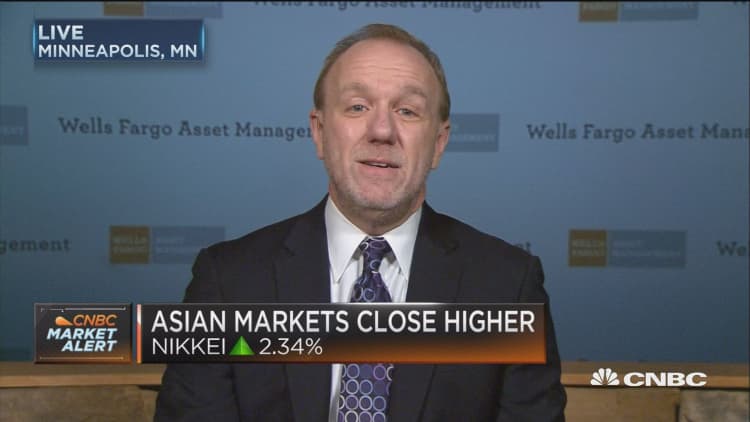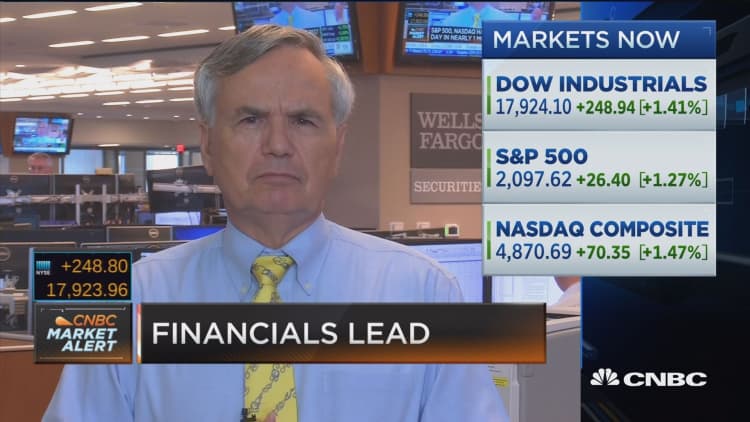


The market is not only prepared for a potential U.K. exit from the European Union, but stocks can likely hit new highs once this week's referendum is over, Jim Paulsen, chief market strategist at Wells Capital Management, said Monday.
The Dow and were up more than 1 percent on Monday as the British remain in the EU camp closed the gap with the leave camp over the weekend. The Euro Stoxx 600 was up nearly 3.5 percent and on pace for its best day since August.
"Brexit reminds me a little bit of the fiscal cliff, kind of a self-inflicted wound that is probably outsized in terms of the fear it's generated," Paulsen told CNBC's "Squawk Box."
"I think we get beyond it, probably, and we get back more to fundamentals, and I think those are looking better and better," he said.
The current stock market rally is broad based, and low-yielding bond markets present little competition to stocks, he said. Paulsen also sees rising economic momentum in positive measures of economic surprises.
Further, he said, markets appear to be overcoming negative news and climbing a wall of worry. "Fear is back, and it's the backdrop for this bull, and I think it's going to take us to new highs," he said.
In another interview, John Silvia, Wells Fargo Securities chief economist, said the market has undergone a change in sentiment, but investors must remain cautious in light of the chance of increased volatility.
The problem immediately following Brexit would be flight to safe-haven assets, which would boost the U.S. dollar, he told CNBC's "Squawk on the Street."
However, that would likely make the Federal Reserve wait longer to raise interest rates since a stronger dollar effectively tightens monetary policy, he said. The potential weakening of European and U.K. economic growth following a separation would likely bolster the case for the Fed to keep rates low and the European Central Bank to further ease them, according to Silvia.

Fear the U.K. will abandon the EU has weighed on the pound and euro and supported the Japanese yen and gold.
Stay or go, those Brexit trades may unwind, according to Joseph Trevisani, chief market strategist at online trading platform WorldWideMarkets.
"The moves that we've seen, particularly in currencies, which have been very volatile with this, are going to be reversed whichever way the vote goes," he told "Squawk Box."
If the leave camp wins, the U.K. would not immediately separate from the EU, so the market moves that Brexit fears produced are likely to unwind as investors await the terms of the separation, he said. Ultimately, he does not see the relationship changing much, because both parties are predisposed to maintain it.
David Kelly, JPMorgan Funds global strategist, said a stay vote would certainly be good for assets because it reduces uncertainty and returns markets to the status quo. But he, too, said some market watchers — including Federal Reserve Chair Janet Yellen — might be putting too much emphasis on Brexit.
"If they vote to leave, it's really hard to know how markets are going to react because there's been so much negative pressure on sterling, so much negative pressure on global markets," he said.
It may be that markets have already priced in the negative impacts of Brexit, he said.
"What we could easily see happen is a sort of sell the rumor, buy the fact, where people wake up the next morning and and say, 'OK, well maybe we'll be OK here," he said.
But senior management at financial institutions have been surprised that clients are not taking steps to minimize risks ahead of the vote, said Barrington Pitt Miller, equity research analyst Janus Capital.
"The general position is probably erring towards hoping for remain, which I think is a logical hope if you're active in global markets," he told "Squawk on the Street."
"But I definitely think the tail risk to the down side — if you start to question the European project's integrity — is very, very serious for global markets," he said.
Should the U.K. vote to leave, JPMorgan's Kelly does not expect Europe to give it a sweetheart deal. The continent will likely play hardball with Britain on trade terms in order to discourage other members from following its lead, he said.


